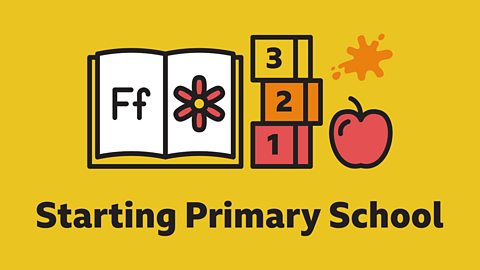This article was last updated on 27 October 2020
by Nsimire Bisimwa, Family Psychotherapist
Going to school for the first time is a big event for children, whatever their previous experience of pre-school. Living in two homes adds another layer for a child and their parents to manage. So if you are able to work together, your child will really benefit from your joint support during the changes ahead.

1. Applying for a school place
Whilst it may be difficult, itÔÇÖs important that you both try to talk about what you want for your child, and which school would suit them best. Gather information about potential schools in both your areas and try to visit them together. As with all school applications youÔÇÖll need to check with your local authority how the process and criteria work, but for co-parents there will be extra things to think about.
- Talk about whoÔÇÖll take responsibility for completing the application, and note the deadline for this.
- Applying for a school place usually means having to provide one home address, even if the custody is split 50/50. This might be the first time youÔÇÖve had to formalise your childÔÇÖs shared living arrangements and itÔÇÖs your responsibility as parents to agree which address to use and to provide supporting evidence. Check how the application process works in your area, as policies vary. Local authorities sometimes have specific advice for families in ÔÇśspecial circumstancesÔÇÖ, or ask you to complete split residency forms, but often only one address can be used.
- If you donÔÇÖt nominate an address, or youÔÇÖre not able to agree on which one to use, the local authority might decide for you. TheyÔÇÖd base this decision on where your child lives for most of the school week, where your child benefit is paid, or a doctorÔÇÖs address.
2. When you get your school place offer
Most children in the UK get the school place they want, but this isnÔÇÖt always the case. This can be disappointing and you may decide to appeal, but stay positive, focus on your child and work together.
- When the offer comes through, talk about whether to accept the place - itÔÇÖs a decision which can have a big effect on your shared parenting.
- If you accept the place, decide who will respond to the offer.
- If you decide to appeal, draw up a detailed plan with clear tasks; identify things that you need to do together and separately, like paperwork, phone calls or school visits.
- Whilst youÔÇÖre appealing, itÔÇÖs essential you accept a backup place so that your child isnÔÇÖt left without an alternative if youÔÇÖre unsuccessful. Keep talking positively about this option, as your child may end up there ÔÇô see this article for more tips.
- Your child will not understand most of these processes, but regardless, working together will help to show your child that youÔÇÖre interested in their school life.
3. Money
Talking about money is challenging and it can be even more uncomfortable discussing it when youÔÇÖre separated, but starting school comes with costs like uniform, school trips and clubs and possibly wrap-around childcare too. Think about the financial implications of your child starting school and work out a clear and reasonable budget and how this would fit into your current arrangements. Have these conversations early on.
4. Starting school: rules and routines
Research shows that routines help children navigate through change. Multiple sets of rules can cause confusion, so itÔÇÖs really helpful to work out some mutual principles to follow.
- Identify which routines are key in your home and discuss these with the other parent. ItÔÇÖs common for parenting styles to be different, but agreeing on some standard approaches is crucial.
- Put similar routines in place in both homes - doing homework after dinner or reading before bedtime, for example. Try to talk about how theyÔÇÖre going in each home and if adjustments need to be made, talk to your child too so they donÔÇÖt come as a surprise. Involve them in the planning using pictures, drawing or toys. But where possible try to make as few changes as you can.
- Establish when your child will be staying at each home and make clear how and where pick-ups and drop-offs will happen.
- Share these routines with your child in a simple and understandable way; timetables, charts or posters to look at are helpful.
5. Your childÔÇÖs homes
Each parent only has one home, but your child has two and itÔÇÖs crucial that they feel comfortable in both, and never like just a visitor in either. They should have an allocated space in both homes with a place for their clothes and toothbrush, a toy box, and a simple learning table. This means that your child is likely to need two sets of everything if possible, and youÔÇÖll need to keep track of things like PE kits. Creating a sense of belonging will help them to feel safe, emotionally secure and ready to learn.
6. Communicating with school
ItÔÇÖs really helpful to talk to school from the beginning about how your family works. The more the school understands about your childÔÇÖs life, the better they will be able to support them as they settle in.
- Share information about your arrangements for drop-off and pick-up.
- Most schools will ask for emergency contacts in order of preference. Let the school know how you would prefer to be contacted, taking into account your availability and who your child is living with on particular days.
- Let the school know about any adults who are and are not allowed to be involved in your childÔÇÖs school life.
- Make sure both of you receive newsletters and notices about events like parentsÔÇÖ evening, and decide whoÔÇÖll attend.
- Keep each other informed of anything going on for your child at school including school trips, birthday party invites, and even fallouts with friends.
7. Communicating within the family
YouÔÇÖll need to communicate with each other about how your child is getting on, and doing this in a calm and respectful way will reassure your child and help them feel secure. This goes for talking to your child about each other too, even if youÔÇÖre not getting on.
Notice any changes in your childÔÇÖs behaviour and talk to each other about how theyÔÇÖre coping. Think about how your living arrangements are affecting them, and be prepared to make adjustments where necessary. Crucially, communicate with your child. Make time to talk with them, asking them about the details of their day, and be available to listen to what they say.
Shared parenting is not half the parenting job - it can often be harder. It takes focused effort as you live in separate homes and have to overcome your differences. But aiming for perfection is a foolÔÇÖs errand. All parents, separated or not, make mistakes and miss things to do with school; bear in mind that things usually work out fine. And remember that in order to be a good parent, you need to look after yourself too!
Nsimire Bisimwa is a Family Psychotherapist at the Tavistock and Portman NHS Foundation Trust.
For further information check out the rest of which has lots of ways to help prepare children for different aspects of school life ÔÇô both practically and emotionally.

More from 91╚╚▒Č Bitesize Parents' ToolkitÔÇŽ
Parents' Toolkit
Fun activities, real-life stories, wellbeing support and loads of helpful advice - we're here for you and your child.

Gemma and Gorka: Tag team parenting
Gemma Atkinson and her partner, Strictly Come Dancing's Gorka Marquez, share their parenting journey and tips for on-the-go parents.

Six ways to manage loneliness as a parent
Here are six tips from the experts at the Marmalade Trust to help talk about loneliness and find support as a parent.

How to help your child be independent
Early years specialist Claire gives three ways you can help your child to be independent.

Game - My First Day at School
Explore with your child what their first day of school might be like and play some classroom activities.

More Starting Primary School videos and articles
Head to our homepage to help you and your child prepare for starting primary school and thrive in school life.
